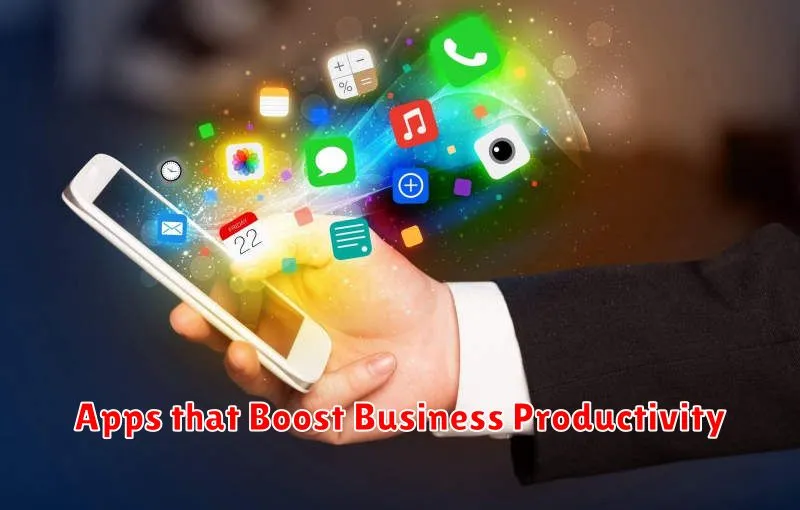In today’s rapidly evolving digital landscape, mobile technology has become an indispensable tool for businesses seeking to enhance their efficiency and productivity. The pervasive nature of smartphones and tablets has unlocked unprecedented opportunities for organizations to streamline operations, improve communication, and boost overall performance. This article will delve into the transformative power of mobile technology and its profound impact on business efficiency, exploring how businesses can leverage these advancements to gain a competitive edge in the modern marketplace. We will examine the key benefits of integrating mobile technology into various business processes, from customer relationship management (CRM) to supply chain management and beyond.
The strategic implementation of mobile technology offers a plethora of advantages for businesses of all sizes, empowering employees with the flexibility and agility to work from anywhere, anytime. By providing instant access to information, data, and communication tools, mobile devices enable real-time decision-making and facilitate seamless collaboration among team members. This article will discuss the various ways in which mobile technology is revolutionizing business efficiency by optimizing workflows, automating tasks, and reducing operational costs. Furthermore, we will explore the crucial role of mobile technology in enhancing customer engagement and driving business growth in an increasingly mobile-first world.
Rise of Mobile Technology in Business
The proliferation of mobile devices has profoundly impacted the business landscape. Smartphones and tablets, now ubiquitous tools, have driven a significant shift in operational strategies and customer engagement. This mobile revolution empowers employees with unprecedented flexibility and access to information, fostering increased productivity and collaboration.
Businesses have rapidly adopted mobile technology to streamline operations. Real-time data access allows for informed decision-making and efficient problem-solving. Mobile applications facilitate tasks such as inventory management, sales tracking, and customer relationship management, previously tethered to desktop systems. This mobility enhances responsiveness to market changes and improves overall business agility.
Mobile Solutions for Remote Teams
Mobile technology plays a crucial role in facilitating effective communication and collaboration for remote teams. Various solutions cater specifically to the needs of distributed workforces.
Communication apps offer instant messaging, video conferencing, and file sharing capabilities, enabling seamless interaction regardless of location. These tools are essential for maintaining team cohesion and project momentum.
Project management apps help organize tasks, track progress, and manage deadlines. This ensures everyone stays aligned and projects are completed efficiently. Mobile access to these platforms is vital for remote team members.
Cloud storage solutions provide secure access to shared files and documents from any device. This eliminates the need for emailing large files and simplifies version control, enhancing collaboration.
Apps that Boost Business Productivity

Mobile technology offers a wide range of applications designed to significantly enhance business productivity. These tools empower employees to work more efficiently, regardless of location. Communication apps facilitate seamless teamwork and information sharing.
Project management apps streamline workflows and improve team collaboration. They offer features like task assignment, progress tracking, and deadline management. Furthermore, customer relationship management (CRM) apps help businesses manage customer interactions and data effectively, leading to improved customer satisfaction and retention.
Other valuable productivity apps include cloud storage solutions, note-taking applications, and time management tools. Businesses should carefully evaluate their specific needs and choose apps that align with their workflows and objectives.
Mobile Security Best Practices
Protecting sensitive business data on mobile devices is paramount. Implementing robust security measures is crucial for mitigating risks.
Employ strong passwords or biometrics. Regularly update your operating system and applications to patch security vulnerabilities. Be cautious when using public Wi-Fi and avoid connecting to unsecured networks.
Install and enable remote wiping and device location features. Consider using a mobile device management (MDM) solution to enforce security policies and manage devices.
Enhancing Customer Engagement
Mobile technology presents powerful tools for enhancing customer engagement. Personalized experiences are key. Mobile apps allow businesses to tailor content and offers based on individual customer preferences and behaviors.
Real-time communication is another significant advantage. Push notifications, in-app messaging, and SMS updates keep customers informed and engaged with relevant information. This direct line of communication fosters a stronger connection between businesses and their customers.
Furthermore, mobile technology facilitates interactive experiences. Features like loyalty programs, gamification, and personalized recommendations encourage active participation and build brand loyalty.
Mobile Payment Systems
Mobile payment systems have revolutionized how businesses conduct transactions. These systems leverage mobile technology to facilitate payments for goods and services, offering a convenient and efficient alternative to traditional methods like cash or cards.
This technology enables businesses to accept payments anytime, anywhere, expanding their reach and potentially increasing sales. Customers benefit from the speed and ease of use, eliminating the need for physical wallets.
Key features of mobile payment systems include contactless payments (NFC), QR code scanning, and in-app purchases. These functionalities streamline transactions, enhance customer experience, and reduce processing time.
Integrating Mobile with Other Business Tools
Integration is key to maximizing the benefits of mobile technology. Connecting mobile devices with existing business tools streamlines workflows and enhances productivity.
Consider integrating mobile with:
- Customer Relationship Management (CRM): Mobile CRM access empowers sales teams with real-time customer data.
- Enterprise Resource Planning (ERP): Mobile ERP enables employees to access critical business information from anywhere.
- Project Management Software: Mobile access facilitates project updates and team collaboration.
Seamless integration eliminates data silos and ensures everyone operates with the most current information.
Challenges of Mobile Tech Integration
While mobile technology offers significant potential, businesses face several key challenges during integration. Security remains a paramount concern, encompassing data breaches, device vulnerabilities, and access control.
Cost is another factor, including initial investment in hardware and software, ongoing maintenance, and employee training. Compatibility issues with existing systems and infrastructure can also hinder smooth integration.
Furthermore, managing diverse mobile devices and operating systems adds complexity to IT support and software development. Finally, ensuring user adoption through adequate training and support is crucial for successful mobile technology implementation.
Success Stories: Businesses Leveraging Mobile
Domino’s Pizza saw a significant increase in online orders after launching their mobile app, allowing customers to easily customize and track their orders from anywhere. This streamlined process enhanced customer experience and boosted sales.
Salesforce, a leading CRM platform, empowers its sales teams with mobile access to customer data, sales tools, and real-time analytics. This mobility allows for increased productivity and responsiveness, ultimately leading to better customer relationships and higher close rates.
UPS utilizes mobile technology to optimize delivery routes, track packages in real-time, and provide customers with up-to-the-minute delivery information. This improves operational efficiency, reduces costs, and enhances customer satisfaction.
Future Mobile Trends to Watch

The mobile landscape is constantly evolving. Staying ahead of the curve is crucial for businesses to leverage the full potential of mobile technology. Here are some key trends to watch:
Artificial Intelligence (AI) Integration
AI is becoming increasingly integrated into mobile devices, powering personalized experiences, advanced analytics, and automated tasks.
5G and Enhanced Connectivity
The rollout of 5G and other advanced connectivity solutions is enabling faster speeds, lower latency, and improved reliability, unlocking new possibilities for mobile applications.
Focus on Mobile Security
With growing mobile usage, security is paramount. Mobile threat defense and enhanced authentication measures are becoming increasingly important.

